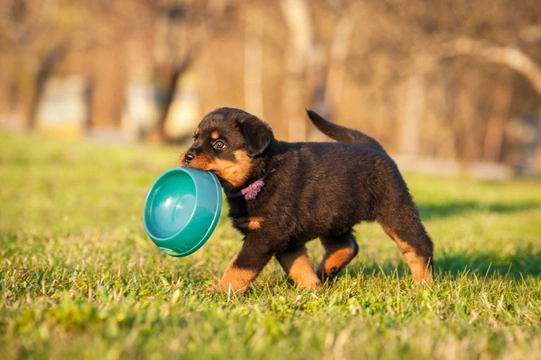
Feeding your Rottweiler the right diet
The Rottweiler is a large breed of dog that is also very muscular, and they are widely used across the world in working roles as security or police dogs, and to guard people and property. However, they are also really popular as pets with owners from all walks of life, and make very loving and affectionate companions.
Despite their rather fearsome appearances-not helped of course by the fact that they tend to be used in film and on TV when a threatening-looking dog is required-they are actually very kind, gentle dogs that love nothing more than enjoying the company of their family, and cuddling up on the sofa-if they can fit! They are also very loyal and can be protective of their favourite people, notably children in particular.
As a large breed dog that is also very muscular, the Rottweiler needs to be fed fairly large portions in order to support their build and size-but they are built for strength rather than lots of high-speed running around, and while they need as much exercise as the next dog, they are not among the most high-energy of breeds.
This means that the Rottweiler owner needs to ensure that they feed their dogs the right balance of nutrients and calories to support healthy life without piling on the pounds, which is one of the challenges the breed faces. Additionally, Rottweilers have a slightly higher propensity to suffering from allergies than most other breeds, and this is something that needs to be approached with care too.
In this article, we will look at the considerations to bear in mind when it comes to feeding a Rottweiler, and how to ensure that they get an appropriate and balanced diet. Read on to learn more.
Rottweiler weight and calories
Rottweilers tend to be comparatively heavy for their height, due to their naturally muscular builds. This means that their healthy weight is likely to be rather higher than that of most breeds of the same height, because muscle weighs more than fat!
While the weight of a Rottweiler can vary considerably from dog to dog, they tend to weigh at least 85-90lb at the bottom end of the scale, going right up to 125-130lb at the top. Overweight and underweight dogs of the breed may fall outside of these parameters-but even for an average healthy weight range, that is quite a lot of variation!
When it comes to the right amount of calories to support this type of weight range, you may be looking at anything from 1800-2,300 per day, depending on how large and active your dog is.
It is important that their diet and calorie intake can be adapted to match their activity levels, because obesity can be a big problem for the Rottweiler breed, which can place a lot of strain on their joints and bones and lead to other health problems.
Nutritional balance
When it comes to the nutritional make up of your Rottweiler’s diet, they require good quality nutrition and protein, without a lot of additives of fillers. The meat protein content of your dog’s diet should be 20% at a bare minimum, up to around 28% for the most active dogs. Look for a breed-specific food designed for Rottweilers, or a diet that uses good quality single-source meat protein, and not a high level of carbs or fats.
Good and bad ingredients for a Rottweiler
Protein is the most important ingredient when it comes to giving the Rottweiler a healthy diet, and you should also seek to choose a food that does not contain a lot of flavourings, colourants, additives or fillers.
Fillers in dog food tend to be grain-based, with wheat, corn and rice being the most commonly used.
Wheat is a very cheap filler that contains very few usable nutrients for your dog, and corn is not much better-so try to feed a diet that is free of these grains, or only contains a very low amount of them.
While rice is also a filler, this is rather better that grains because rice provides a good source of slow-release energy in the form of carbohydrates. Look for a food that is either grain-free, or uses rice as a source of vegetable carbohydrate.
While Rottweilers need to have a carefully managed diet to ensure that they do not become overweight, they do still need some fat in their diet, but look for a food that provides “healthy” fats, such as fish oil and Omega 3, so that your dog’s body can process and use it effectively.
Allergies and other challenges the breed can face
Rottweilers can be prone to allergies, and sometimes you will find that your dog will be sensitive to a certain food ingredient in common diets. This is why it is wise to pick what your dog eats carefully and avoid grain fillers (a common source of allergies) and other unnecessary ingredients, as an allergy or sensitivity can lead to digestive upsets, a poor quality coat, and other issues.
If you think your dog is allergic to a certain food ingredient, it is wise to get your vet to test them for triggers, so that you can avoid these things in your dog’s diet in future.



